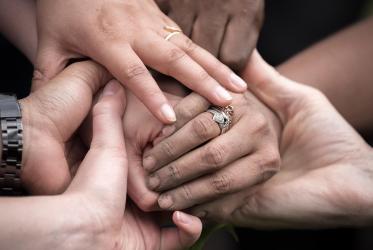Displaying 1 - 15 of 15
What can churches do to prevent modern slavery?
22 February 2024
Seminar: The Feast of Creation and the Mystery of Creation: Ecumenism, Theology, Liturgy, and Signs of the Times in Dialogue
15 - 16 March 2024
Cittadella Laudato Si’ (known as “Cittadella”) – Via degli Ancaiani 3, Assisi
WCC and partners to host seminar in Assisi on Feast of Creation
21 February 2024
International Labour Organization celebrates 100 years
15 April 2019
Building peace in solidarity with the poor
12 September 2011






